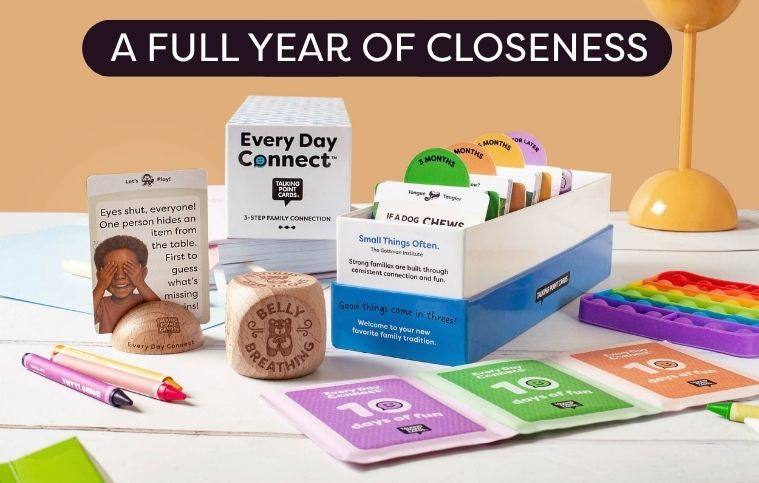SHOP
About
The Science Behind Family Communication
Why It Matters and How to Improve It

Ever feel like you're living with a bunch of strangers who happen to share your last name? You're not alone. Family communication is one of those things that seems like it should be easy - after all, these are the people you've known your whole life (or at least a big chunk of it). But in reality, talking to your family members can sometimes feel harder than decoding ancient hieroglyphics while blindfolded and riding a unicycle.
So why is family communication so darn tricky? And more importantly, how can we actually get better at it? Buckle up folks, because we're about to dive deep into the fascinating (and sometimes messy) world of family communication.
Why Family Communication Matters (Like, A Lot)
Before we get into the nitty-gritty of how to improve your family's conversation skills, let's talk about why this stuff actually matters. Because let's face it - sometimes it's tempting to just give up and communicate solely through grunts and the occasional passive-aggressive Post-it note.
But here's the thing: good family communication is kind of a big deal. Research shows that families who communicate effectively tend to be happier, healthier, and better equipped to handle life's inevitable curveballs. It's like a superpower for your family unit.

Some key benefits of strong family communication include:
-
Stronger relationships and emotional bonds
-
Better problem-solving skills
-
Increased self-esteem for family members
-
Lower stress levels
-
Improved mental health
-
More effective conflict resolution
In other words, figuring out how to talk to each other isn't just about avoiding awkward silences at the dinner table (although that's a nice perk). It's about building a resilient family unit that can weather any storm.
The Science of Family Communication: What's Really Going On?
Alright, time to put on our nerd goggles and look at what's actually happening in our brains when we try to communicate with our loved ones. Because spoiler alert: it's not as simple as words going in one ear and out the other.
The Brain's Role in Communication
When we communicate, our brains are working overtime. They're processing verbal and non-verbal cues, interpreting tone and body language, accessing memories, and formulating responses - all in a matter of seconds. It's like running a marathon while simultaneously solving a Rubik's cube and reciting the Declaration of Independence backwards.
But here's where things get really interesting: our brains actually change based on our communication patterns. Yep, you read that right. The way we talk to our family members can literally rewire our neural pathways.
This neuroplasticity means that improving family communication isn't just about changing behaviors - it's about changing our brains. Pretty cool, right?
The Role of Emotions in Family Communication
Now, let's talk about the elephant in the room (or should I say, the amygdala in the brain): emotions. Family interactions are often charged with feelings, both positive and negative. And these emotions can have a huge impact on how we communicate.
When we're feeling stressed, angry, or defensive, our brain's fight-or-flight response kicks in. This can lead to:
-
Difficulty processing information
-
Reduced ability to empathize
-
Tendency to misinterpret neutral comments as negative
-
Increased likelihood of saying things we don't mean
On the flip side, positive emotions can enhance communication by:
-
Increasing openness to new ideas
-
Improving listening skills
-
Fostering creativity in problem-solving
-
Strengthening emotional bonds
The takeaway? Managing emotions is a crucial part of effective family communication. (More on how to do that later!)
Common Barriers to Effective Family Communication
Now that we understand why family communication matters and what's happening in our brains, let's look at some common roadblocks that can derail even the best intentions.
1. The Generation Gap
Remember when you thought your parents were hopelessly out of touch? Well, now you might be the one scratching your head at your kids' slang. The generation gap can create misunderstandings and frustration in family communication.
2. Technology Overload
We live in a world where it's possible to be constantly connected... and yet somehow feel more disconnected than ever. Excessive screen time and digital distractions can hinder face-to-face communication and emotional connection.

3. Busy Schedules
Between work, school, extracurriculars, and the occasional need for sleep, many families struggle to find time for meaningful conversation. Quality communication often takes a backseat to the daily grind.
4. Communication Styles
Each family member may have a different communication style. Some are direct, others are subtle. Some are talkers, others are listeners. These differences can lead to misunderstandings and frustration.
5. Unresolved Conflicts
Old grievances and unaddressed issues can create tension and make open communication difficult. It's hard to talk about today's problems when yesterday's are still looming large.
6. Fear of Vulnerability
Opening up to family members can feel risky. Fear of judgment, rejection, or conflict can lead to superficial communication or avoidance of important topics.
How to Improve Family Communication: Practical Strategies That Actually Work
Alright, we've covered the why and the what. Now let's get to the good stuff: how to actually improve your family's communication skills. Don't worry, I promise these tips are more practical than "just talk more" (although, spoiler alert, that is kind of important).
1. Create Dedicated Family Time
Remember how we talked about busy schedules being a barrier? Well, it's time to fight back. Set aside regular time for family interaction - whether it's daily dinners, weekly game nights, or monthly outings. The key is consistency and making it a priority.
Pro tip: Put it on the calendar. Treat family time like any other important appointment.
2. Practice Active Listening
Listening isn't just about hearing words - it's about truly understanding. Encourage family members to practice active listening by:
-
Giving full attention (yes, that means putting down the phones)
-
Using non-verbal cues like nodding and maintaining eye contact
-
Asking clarifying questions
-
Paraphrasing to ensure understanding
3. Use "I" Statements
When discussing sensitive topics or conflicts, frame statements in terms of your own feelings and experiences rather than accusations. For example, "I feel frustrated when the dishes are left in the sink" instead of "You never do the dishes!"
4. Establish Family Communication Rules
Create guidelines for how your family will communicate. This might include things like:
-
No interrupting
-
Respecting differing opinions
-
Taking turns speaking
-
Using a "talking stick" or other object to indicate who has the floor
5. Embrace Technology (Mindfully)
While too much screen time can hinder communication, technology can also be a tool for connection. Use video calls to keep in touch with distant family members, or try family messaging apps for quick check-ins throughout the day.
6. Practice Emotional Intelligence
Remember how we talked about the role of emotions in communication? Working on emotional intelligence can have a big impact. This includes:
-
Recognizing and naming emotions
-
Understanding triggers
-
Developing healthy coping mechanisms
-
Practicing empathy
7. Create a "Judgment-Free Zone"
Foster an environment where family members feel safe sharing thoughts and feelings without fear of criticism. This doesn't mean agreeing with everything, but it does mean responding with respect and empathy.
8. Use Conversation Starters
Sometimes the hardest part is just getting the ball rolling. Keep a list of conversation starters handy for when you need a little inspiration.
Some ideas:
-
"What was the best part of your day?"
-
"If you could have any superpower, what would it be and why?"
-
"What's something you've always wanted to try but haven't yet?"
9. Address Conflicts Promptly and Constructively
Don't let issues fester. Address conflicts as they arise, focusing on problem-solving rather than blame. Use the communication skills we've discussed (active listening, "I" statements, etc.) to work through disagreements.
10. Celebrate Communication Wins
Positive reinforcement works wonders. When you notice improvements in your family's communication, acknowledge and celebrate them. This could be as simple as saying "I really appreciated how we handled that discussion" or as elaborate as a special family outing to mark progress.

The Long-Term Impact: Building a Legacy of Communication
Improving family communication isn't a one-and-done deal. It's an ongoing process that requires patience, practice, and persistence. But the payoff? Totally worth it.
By investing in your family's communication skills, you're not just improving your day-to-day interactions. You're building a legacy of open, honest, and effective communication that can be passed down through generations. You're creating a family culture where everyone feels heard, understood, and valued.
And let's be real - in a world that can often feel chaotic and disconnected, having a strong family communication foundation is like having a superpower. It's your secret weapon for navigating life's challenges, celebrating successes, and building deep, meaningful relationships with the people who matter most.
So go forth and communicate, my friends. Your future family gatherings (and your brain's neural pathways) will thank you.
The Art and Science of Family Talk
We've covered a lot of ground here, from the neuroscience of communication to practical tips for getting your family talking. But if there's one key takeaway, it's this: effective family communication is both an art and a science.
The science part? That's all the research on brain plasticity, emotional intelligence, and the benefits of strong family bonds. It's the evidence-based strategies and techniques we've discussed.
The art? That's how you apply these concepts in your unique family context. It's the creativity, patience, and love you bring to the process of improving your family's communication.
So don't get discouraged if it doesn't all click into place immediately. Like any art form, mastering family communication takes practice. There will be masterpieces and there will be... well, let's call them "abstract expressionist periods". But with time, effort, and a willingness to keep learning and growing together, you can create a family communication style that's worthy of the Louvre (or at least the refrigerator door).
Now get out there and start talking! Your family's waiting.
LIKED THIS ARTICLE?
SIGN UP FOR MORE!






